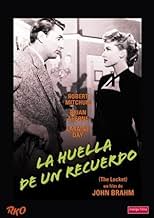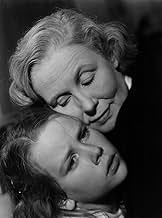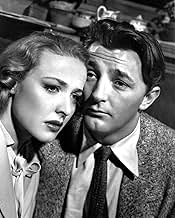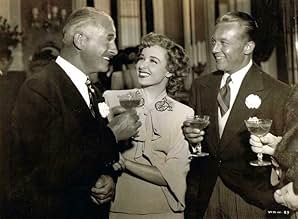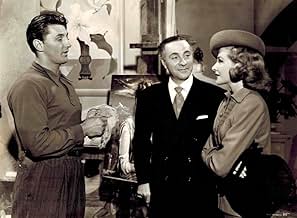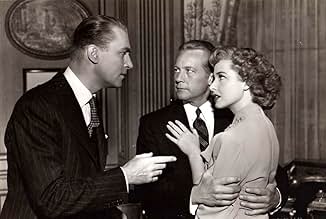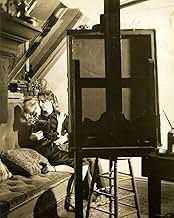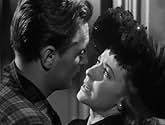NOTE IMDb
7,1/10
3,4 k
MA NOTE
Ajouter une intrigue dans votre langueJust before his wedding, the bridegroom hears a complex tale painting his lovely bride as devilish and unbalanced.Just before his wedding, the bridegroom hears a complex tale painting his lovely bride as devilish and unbalanced.Just before his wedding, the bridegroom hears a complex tale painting his lovely bride as devilish and unbalanced.
- Réalisation
- Scénario
- Casting principal
- Récompenses
- 4 victoires au total
Helene Thimig
- Mrs. Monks
- (as Helen Thimig)
Mari Aldon
- Mary
- (non crédité)
Polly Bailey
- The Cook
- (non crédité)
Avis à la une
This film by underrated director John Brahm is one of the more interesting works of the 1940s (not one of the best, but different).
Laraine Day plays Nancy, about to marry and hiding some dark secrets in her past. She was excellent at this kind of thing. Gene Raymond (not the most charismatic of actors but surprisingly good here) plays her intended, with Brian Aherne as the psychiatrist who knows about her previous life.
In flashback we see Nancy and her husband (a young Robert Mitchum) and then into another flashback (daring to attempt this at the time when many films were still pursuing conventional structure).
'The Locket' of the title obviously holds the key to the mystery, and we have an absorbing time pulling all the loose ends together. Reginald Denny, Ricardo Cortez, and Ellen Corby decorate an accomplished cast.
Laraine Day plays Nancy, about to marry and hiding some dark secrets in her past. She was excellent at this kind of thing. Gene Raymond (not the most charismatic of actors but surprisingly good here) plays her intended, with Brian Aherne as the psychiatrist who knows about her previous life.
In flashback we see Nancy and her husband (a young Robert Mitchum) and then into another flashback (daring to attempt this at the time when many films were still pursuing conventional structure).
'The Locket' of the title obviously holds the key to the mystery, and we have an absorbing time pulling all the loose ends together. Reginald Denny, Ricardo Cortez, and Ellen Corby decorate an accomplished cast.
Brahm's intricately constructed film is based on the obvious conceit of a locket: in psychoanalytical terms, it symbolises repressed memory and of the 'opening up' of hidden psychosis. In a filmic sense of course, The Locket itself is a cinematic 'locket', the flashbacks within flashback structure reflecting the secret enclosure typical of such a piece of jewellery.
In fact I can't think of another film that takes this much commented narrative technique to such extremes. Mitchum of course was well used to playing heros faced with abnormal feminine psychology. He faces similar femme fatales in Preminger's 'Angel Face' for instance and in Farrow's 'Where Danger Lives' - all made at around the same time (end 40's, start of 50's). This may reflect something of the obsession that Hollywood had with cod Freudianism just as much as noir convention, but there is no doubting that Mitchum's peculiar manner as an actor, his doe-eyed sleep-walking acting style, made his starring excursions into the dangers of the subconscious peculiarly effective.
Brahm, one of Hollywoods most neglected directors at least for the work that he did at this time in his career, makes the somewhat over- stretched structure of the film work, pun intended, like a dream. Nancy's final walk to the altar, immediately before her mental and psychic collapse, although necessarily melodramatic, is very effective version of a personal calvary and she seems stunned and trance like. In retrospect, of course, it is easy to see how the whole of the preceding film has been leading up to this sequence, (just as how the flashback structure of the film reminds one in passing of 'Citizen Kane') but the sound and vision montage is still powerful.
By setting the bulk of the film in flashback, Brahm places it in the past - or, more precisely, in the imaginatively reconstructed past, and it is this dream-sense that retains a powerful grip on the viewer as events unfold. This almost hallucinatory sense, together with a feeling of 'drifting with fate', marks out some of the greatest noirs and B-mysteries made at this time and is what makes this film still very watchable today.
A 'Locket' well worth looking into.
In fact I can't think of another film that takes this much commented narrative technique to such extremes. Mitchum of course was well used to playing heros faced with abnormal feminine psychology. He faces similar femme fatales in Preminger's 'Angel Face' for instance and in Farrow's 'Where Danger Lives' - all made at around the same time (end 40's, start of 50's). This may reflect something of the obsession that Hollywood had with cod Freudianism just as much as noir convention, but there is no doubting that Mitchum's peculiar manner as an actor, his doe-eyed sleep-walking acting style, made his starring excursions into the dangers of the subconscious peculiarly effective.
Brahm, one of Hollywoods most neglected directors at least for the work that he did at this time in his career, makes the somewhat over- stretched structure of the film work, pun intended, like a dream. Nancy's final walk to the altar, immediately before her mental and psychic collapse, although necessarily melodramatic, is very effective version of a personal calvary and she seems stunned and trance like. In retrospect, of course, it is easy to see how the whole of the preceding film has been leading up to this sequence, (just as how the flashback structure of the film reminds one in passing of 'Citizen Kane') but the sound and vision montage is still powerful.
By setting the bulk of the film in flashback, Brahm places it in the past - or, more precisely, in the imaginatively reconstructed past, and it is this dream-sense that retains a powerful grip on the viewer as events unfold. This almost hallucinatory sense, together with a feeling of 'drifting with fate', marks out some of the greatest noirs and B-mysteries made at this time and is what makes this film still very watchable today.
A 'Locket' well worth looking into.
Yes! This is the movie that does just that - but it's worth watching for more than that. It is an inspired piece of film-making with excellent direction and fine photography. It also features some strong performances especially from the (is she or isn't she evil) Laraine Day, and the wonderful Brian Aherne. And Robert Mitchum's pretty good too. The best bits are almost expressionist - especially the music box shots - and it's full of the pseudo psychological nonsense that Hollywood loved so much in this era. Highly enjoyable.
Having recently watched John Brahms' two preceding movies, both centring on psychologically disturbed men (killers in fact) in period features, here the director presents us with an emotionally unstable woman in a contemporary setting. I enjoyed the two earlier films "The Lodger" and "Hangover Square" and I enjoyed this one too.
The lead character is played by Laraine Day, whose beauty attracts men like honey to a bee, although little do they know that she is a closet kleptomaniac with slippery fingers around rich folk's jewellery, her condition traceable to a childhood incident when she covets an expensive locket given to her by the rich little girl whose house her mother serves, but taken back away from her by the girl's mother as too good for her. When the locket later goes missing she is menacingly if mistakenly accused by the mother and given to believe that her shame at this has coloured her future conduct as an adult. Not only do her good looks attract the interest of deep men like Robert Mitchum's artist and Brian Aherne's doctor, it all climaxes in a super-charged betrothal scene to her third beau, the very rich Gene Raymond whose mother's nuptial gift to her of a locket finally unlocks years of denial and guilt on her part.
I'd have to say that the plot certainly overdoes the Freudian associations of Day's Cassandra-like obsession with jewellery. I also couldn't quite imagine Mitchum firstly as a tortured artist and secondly taking the extreme action he does as he gives up Day to Aherne, while the final coincidence of the other locket was just a bit too much to swallow.
Nevertheless, it was again stylishly directed by Brahm with strong performances by Day as the beguiling magpie Nancy, as adept at stealing men's hearts as old folk's jewellery, Aherne as the duped doctor and even Mitchum, miscast as he was. The layered flashbacks I found intriguing while the use of dramatic lighting, staging and music added greatly to the suspense.
1940's Hollywood movies were awash with psychologically disturbed individuals in films from Citizen Kane on down and while this particular feature overdoes the angst more than a bit, it was none the less entertaining for all that.
The lead character is played by Laraine Day, whose beauty attracts men like honey to a bee, although little do they know that she is a closet kleptomaniac with slippery fingers around rich folk's jewellery, her condition traceable to a childhood incident when she covets an expensive locket given to her by the rich little girl whose house her mother serves, but taken back away from her by the girl's mother as too good for her. When the locket later goes missing she is menacingly if mistakenly accused by the mother and given to believe that her shame at this has coloured her future conduct as an adult. Not only do her good looks attract the interest of deep men like Robert Mitchum's artist and Brian Aherne's doctor, it all climaxes in a super-charged betrothal scene to her third beau, the very rich Gene Raymond whose mother's nuptial gift to her of a locket finally unlocks years of denial and guilt on her part.
I'd have to say that the plot certainly overdoes the Freudian associations of Day's Cassandra-like obsession with jewellery. I also couldn't quite imagine Mitchum firstly as a tortured artist and secondly taking the extreme action he does as he gives up Day to Aherne, while the final coincidence of the other locket was just a bit too much to swallow.
Nevertheless, it was again stylishly directed by Brahm with strong performances by Day as the beguiling magpie Nancy, as adept at stealing men's hearts as old folk's jewellery, Aherne as the duped doctor and even Mitchum, miscast as he was. The layered flashbacks I found intriguing while the use of dramatic lighting, staging and music added greatly to the suspense.
1940's Hollywood movies were awash with psychologically disturbed individuals in films from Citizen Kane on down and while this particular feature overdoes the angst more than a bit, it was none the less entertaining for all that.
I give full credit to this little treat for introducing me to the world of noir cinema when I happened to stumble onto it on AMC. (Oh, that AMC showed films of this caliber lately!) Laraine Day gives a beautifully understated performance, handling what would now perhaps be called a tragic case of posttraumatic stress disorder resulting in a life of twists and turns with truth, no scenery chewing. Brian Aherne strikes just the right clinical note as the sadder-but-wiser exhusband, and Robert Mitchum gives a memorable performance as the first (at least the first chronicled in this tale) man to fall victim to Nancy's fatal charms. As Norman, he certainly delivers a farewell present to Nancy's physician spouse, and by extension, to Nancy, that they won't soon forget. The denouement at the mansion while wedding guests await fair Nancy is gripping cinema. Watch for a great performance by the mother of Joan Fontaine and Olivia Dehaviland as the cruel woman responsible for Nancy's childhood trauma. Worth the while!
Le saviez-vous
- AnecdotesNorma Barzman's lengthy treatment for this film, which Sheridan Gibney revised into a screenplay, was inspired by a true event which was recounted to her by financier George Peabody Gardner and his sister Belle. When younger, the Gardners eschewed their aristocratic upbringing partly in reaction to an incident in their youth: As children they became friendly with the daughter of the family's housekeeper. It transpired that the daughter was wrongly accused of stealing a locket, leading to the firing and departure of the housekeeper and her daughter. Years later, they learned that the daughter suffered from depression and was implicated in a theft, a consequence for which the Gardners felt their family was partly responsible.
- GaffesAmerican ambulances, shown driven with left-hand drive, were not used in wartime London.
- Citations
Norman Clyde: I don't take money for nothing. I'm not conducting a class so the parasitic rich can escape boredom. I'm not that hard up.
Nancy Patton: Well, I hope you never will be, Mr. Clyde. I admire your principles. I wish I could say the same for your disposition.
- ConnexionsEdited into Histoire(s) du cinéma: Fatale beauté (1994)
Meilleurs choix
Connectez-vous pour évaluer et suivre la liste de favoris afin de recevoir des recommandations personnalisées
Détails
- Durée1 heure 25 minutes
- Couleur
- Rapport de forme
- 1.33 : 1
Contribuer à cette page
Suggérer une modification ou ajouter du contenu manquant

Lacune principale
By what name was Le médaillon (1946) officially released in India in English?
Répondre
